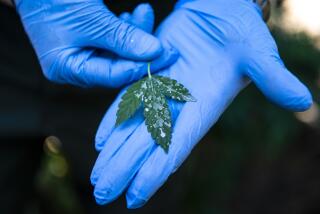Science isn’t on the drug warriors’ side [Blowback]
Former head of the Drug Enforcement Administration Robert Bonner wrote in his Feb. 1 Blowback article, “There is still no such scientific study establishing that marijuana is effective as a medicine.”
Nonsense. Over the last several years, the state of California, via the Center for Medicinal Cannabis Research, has conducted several placebo-controlled, FDA-approved clinical trials affirming the safety and therapeutic efficacy of cannabis. Other institutions have as well. (Click here for an overview of more than 200 such trials.)
Summarizing the findings of many of these trials, Dr. Igor Grant of UC San Diego declared last year in the Open Neurology Journal: “The classification of marijuana as a Schedule I drug as well as the continuing controversy as to whether or not cannabis is of medical value are obstacles to medical progress in this area. Based on evidence currently available the Schedule I classification is not tenable; it is not accurate that cannabis has no medical value, or that information on safety is lacking.”
Bonner’s second claim, that “not a single scientifically valid study by a qualified researcher has ever been denied by the DEA or, for that matter, by the National Institute of Drug Abuse,” is equally specious. In fact, in recent months the NIDA has stonewalled an FDA-approved clinical protocol by researchers at the University of Arizona College of Medicine to assess the treatment of cannabis in subjects with post-traumatic stress disorder. Dr. Sue Sisley, who sought to conduct the study, told Wired.com: “At this point, I can’t help but think they [the federal government] simply don’t want to move forward. Maybe they figure if they stall long enough, we’ll give up and go away.”
Finally, Bonner’s suggestion that advocates would be better served targeting the U.S. Food and Drug Administration is a red herring. The FDA exists to determine whether patented products from private companies can be brought to market. Because the present law forbids any legal private manufacturers to exist, there remains no entity available to fund the sort of large-scale clinical research and development necessary to trigger an FDA review.
This is not to imply that cannabis could not meet the FDA’s objective standards for safety and efficacy. According to a keyword search on PubMed, the U.S. government repository for peer-reviewed scientific research, there are more than 22,000 published studies or reviews in the scientific literature pertaining to marijuana and its biologically active components, making cannabis one of the most studied therapeutic agents on Earth. Further, the plant has been used as medicine for millenniums and is incapable of causing lethal overdose in humans. By objective standards, cannabis is arguably safer than most conventional therapeutics it could potentially replace.
The federal government’s insistence that cannabis remain classified in the same schedule as heroin and in a more prohibitive schedule than cocaine is not based on either science or reason. As opined in a 1997 New England Journal of Medicine article, it is time for federal authorities to “rescind their prohibition of the medical use of marijuana for seriously ill patients and allow physicians to decide which patients to treat.”
ALSO:
McManus: Tax reforms hits home
Paul Armentano is deputy director of the National Organization for the Reform of Marijuana Laws and coauthor of the book “Marijuana Is Safer: So Why Are We Driving People to Drink?”
If you would like to write a full-length response to a recent Times article, editorial or Op-Ed and would like to participate in Blowback, here are our FAQs and submission policy.
More to Read
A cure for the common opinion
Get thought-provoking perspectives with our weekly newsletter.
You may occasionally receive promotional content from the Los Angeles Times.










